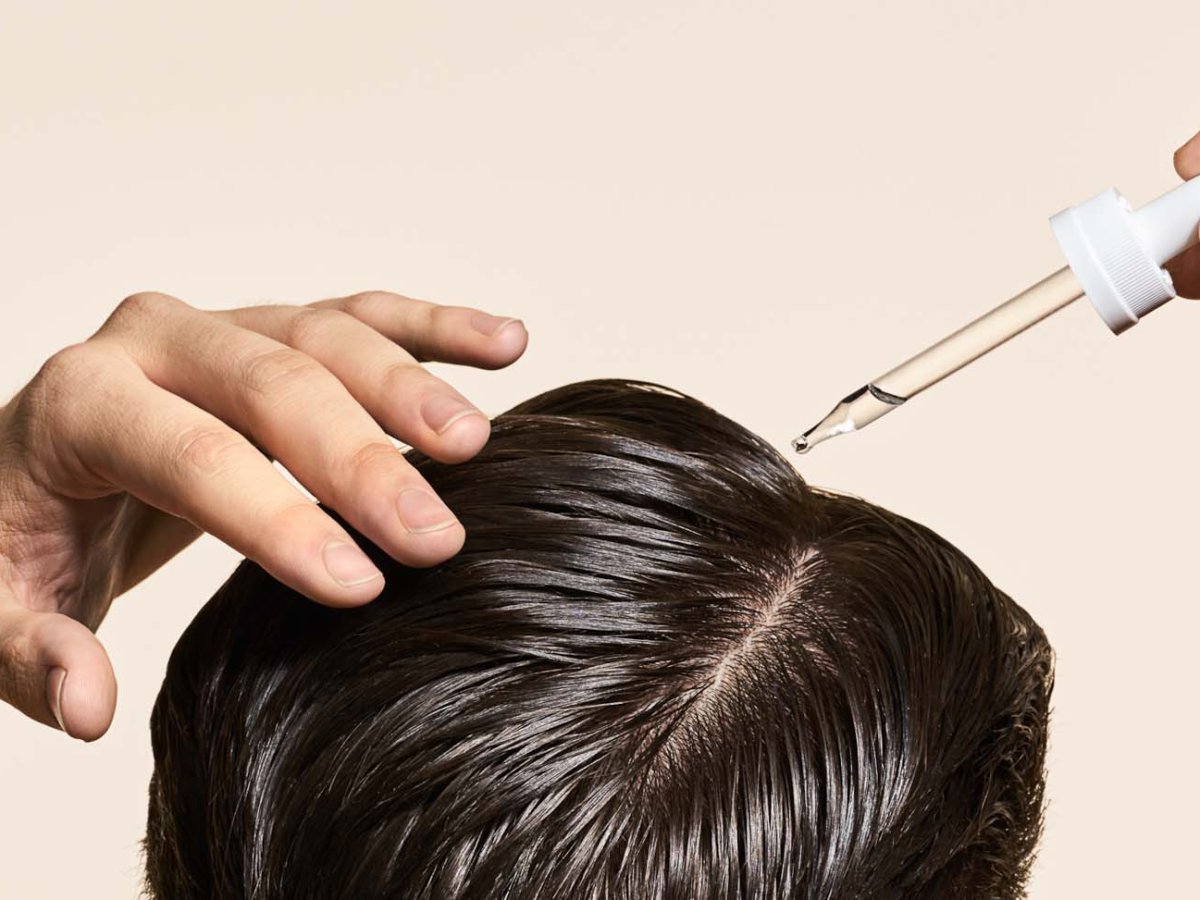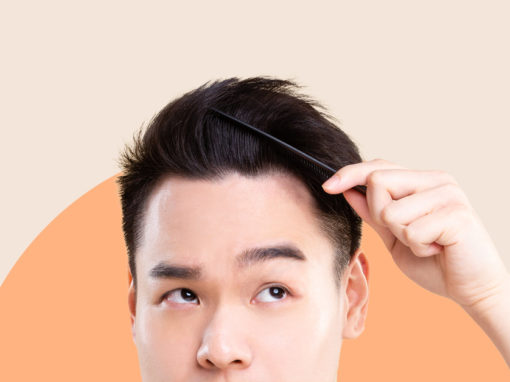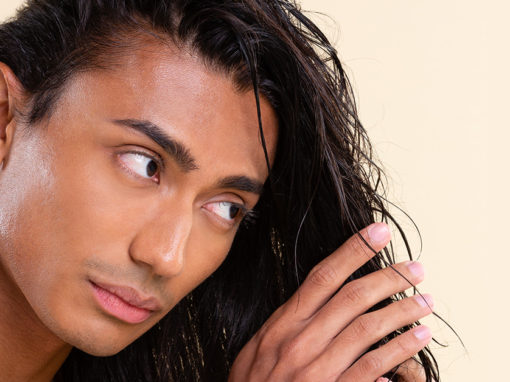Are you feeling an unusual loss of hair strands after combing?
If so, chances are high that it could be an early indication of a receding hairline.
Research done by the American Hair Loss Association has indicated that more than two-thirds of men experience hair fall before 35.
Shockingly by the age of 50, 85% of men experience hair loss or hair thinning. However, the prime cause of this problem is androgenic alopecia or male pattern baldness in layman’s terms.
Several factors contribute to hair fall in men. This ranges from hormonal issues to various medical conditions. As a result, the rate of progress of hair loss can differ from person to person.
For some, it occurs as a sudden loosening of hair, while for others, it happens gradually without them noticing.
Hair fall reasons in men
The following are the main reasons causing hair loss in men.
1. Genetics
Hair fall in men is most often triggered by genes that they get from their ancestors. However, scientists don’t fully understand why specific changes in hormones cause the hair follicles to shrink or why the hair loss pattern is similar in most men across the globe.
Hair loss can start as early as in teens depending on your family history.

2. Deficiencies in essential nutrients
Hair loss is a common sign in people who have a moderate or extreme deficiency in essential nutrients.
This includes deficiency in minerals and essential vitamins such as zinc, iron, vitamin D, vitamin B12, proteins, etc.
3. Hormonal factor
Hair fall is often caused due to hair root’s response to the hormone DHT or dihydrotestosterone, derived from testosterone.
People with androgenic alopecia usually have high levels of DHT at hair follicles
4. Effect of certain medications
Chemotherapy, which is commonly used for the treatment of cancer, can also induce sudden hair fall. However, these effects are temporary, and the effects can be reversed once the treatment is over.
Sometimes hair loss is triggered by the effect of certain medications such as anticoagulants, amphetamines, and lupus medication.
This also includes medicine for high/low blood pressure, depression, arthritis, heart conditions, etc. However, the occurrence is quite uncommon.
5. Underlying medical issues
Certain medical issues, such as thyroid disease, -, can disturb the body’s hormonal balance, resulting in hair loss.
Diseases such as lupus can cause scarring on the scalp region resulting in permanent hair loss.
Health problems such as diabetes can also affect the immune system resulting in hair loss. In addition, specific psychological issues such as trichotillomania (hair-pulling disorder) can also cause temporary balding.
6. Improper hair care
Hair loss can also result due to improper care of your hair. Ensure that you wash off all the dirt, oil, and dust from your hair with shampoo at least twice a week.
While cleaning, avoid vigorous rubbing as this may weaken the roots of the hair.
7. Physical damage to the scalp region
Hair fall can occur due to physical damage to the hair follicles or scalp tissue such as trauma, laceration, and burn. In addition, specific hairstyling techniques require the hair stands to be pulled forcibly, resulting in hair loss.
Chemical-based hair styling products can cause damage to hair follicle, resulting in hair fall.
8. Extreme stress
Some people experience temporary hair fall in the wake of a traumatic event, mental or physical shock. This is mainly caused due to the production of excess stress hormone in the body. The pattern of hair loss in this condition is usually generalised and occurs in rapid progression.
9. Autoimmune problems
In autoimmune disorders, your body mistakes parts of the body such as skin, hair, joints, etc., as foreign objects and releases proteins called antibodies which attack healthy cells.
One of such conditions is called alopecia areata, in which healthy follicles get attacked by the body’s immune system.
10 Unhealthy lifestyle
Certain unhealthy lifestyles can cause hair fall. This includes having meals at improper intervals, consuming excess alcohol, smoking, dieting with poor nutrients, etc.
At what age do men start to show a receding hairline?
In reality, receding hairline in men can start at any age after puberty. So you can see a young man with almost no hair and at the same time an old young man in his 80’s with full hair.
While men reach their 30s, the receding hairline will be visible above the temples and gradually progress backwards as they age.
What is the reason for men losing hair at 25?
There are several reasons why men start to lose hair at the early age of 25. These include:
- Autoimmune disorder
- Hormonal imbalances
- Nutritional deficiencies
- Anxiety or stress
- The side effect of certain medications
- Improper hair care
- Physical damage to the hair etc.
To know more, read our article on reasons for hair loss in men at 25.
Hair loss treatment for men
Let us look at some effective hair loss treatments for men.
1. Hair loss transplantation
Replantation of hair follicles is a sure way to regain back your lost hair. In this surgical procedure, hair follicles that are strongly resistant to DHT are removed from the backside of the head and replanted on the scalp.
2. Laser therapy
In this process, a red light laser of wavelength 600 nm is directly shown over the affected area to induce hair growth. The laser beam will help to stimulate and enlarge the hair follicles reducing hair fall to a considerable extent.
3. Dietary changes
If you are regularly consuming a diet rich in antioxidants, it will help your hair grow healthier and robust. Antioxidants are chemical compounds that help to ward off oxidative stress that causes your hair to fall.
Foods rich in antioxidants include blueberries, almonds, walnuts, spinach, kidney beans, etc.

4. Therapies
This treatment includes using a unique blend of drugs, ointments, and hair growth creams. Make sure to consult a certified dermatologist since skin type varies and so do the treatment options.
5. Essential oils
The effects of essential oils are pretty magical when it comes to hair growth. Oils such as peppermint, rosemary, and lavender can help to reduce hair fall to a great extent if used correctly.
Essential oils have to be mixed with a carrier oil such as jojoba oil, almond oil, or coconut oil before applying to the scalp region. However if your scalp is already oily for a start, you may not want to use this method.
6. Scalp Massage
Scalp massage can potentially help to boost up the amount of blood flow in that region. This will help nutrient-rich blood to quickly transfer oxygen and nutrients to the surrounding tissue.
Regularly massaging your scalp may help reduce hair fall and make your hair grow strong and shiny.
7. Using medicated shampoos
One effective remedy for hair loss treatment is to use medicated shampoos. These hair cleansers help remove stubborn dandruff from your scalp, which might turn chronic if left untreated.
In addition, they also help to thoroughly clean the scalp from dust, dirt, oil, and other harmful pathogens.
Check out our medicated shampoo products.
Medicines for hair fall treatment
Here are some commonly prescribed medications to successfully treat hair loss.
Finasteride
This drug can be effectively used to treat male pattern baldness. Although created for the treatment of prostate cancer, Finasteride’s use for the treatment of hair loss was discovered accidentally.
The drug works by reducing DHT (a hormone that causes hair loss) in the scalp region. This will help to significantly cut down the hair loss in that region.

Minoxidil
Dermatologists commonly prescribe this for the treatment of hair fall.
Minoxidil acts directly on the hair follicles, causing them to grow thicker. People who are signs have reported an immediate stoppage of hair fall after its use.
The drug is usually available in liquid, which has to be directly applied on top of the affected area. On the other hand, minoxidil is typically available in spray forms which are easy to use on top of the affected region.
Corticosteroid medications
These medications help to reduce the inflammation around the hair follicles. This will help to improve the blood flow in the region, causing a stoppage of hair fall.
Usually, corticosteroids are combined with other medications to get faster and lasting results.
Since this drug has some side effects, do consult with a certified dermatologist before using it.
Check out Andsonss options for hair loss treatment plans in Malaysia here.
Is hair regrowth for men possible?
Hairfall in men is caused due to several factors. This could range from slight hormonal imbalances to acute medical conditions.
If hair fall is caused due to certain temporary conditions such as nutrient deficiency, stress, hormonal imbalance, or the effect of certain medications, it can be reversed.
On the other hand, there is no known cure if hair fall occurs due to male pattern baldness.
However, certain medications, such as Minoxidil, Finasteride, Anthralin, etc., slow down the rate of hair loss and help you grow new hair. However, these drugs have to be used continually, and if you stop using these medications, your hair fall will return.
Male hair loss myths- busted
Hair loss has been associated with several myths for centuries. Here are some of the few.
Math 1: All hair loss is permanent
Myth 2: Only elderly suffer from hair fall
Myth 3: Using shampoo can cause hair to fall
Myth 4: Frequently wearing a hat/cap can cause hair to fall
Myth 5: Excessive vitamin consumption can cause hair fall
Myth 6: Only men suffer from hair fall
Myth 7: Men with hair fall have too much/too less testosterone
Myth 8: Direct sunshine cause hair to fall
Myth 9: Masturbation can cause hair fall
Bottom Line
Hair loss can be painful for men, especially if they are in their twenties.
In this article, we have discussed some of the reasons for having hair fall and some effective treatment options.
Make sure that you check with your dermatologist before trying out any of the treatments mentioned above. This is because as scalp conditions vary, so do treatments.
Check out Andsons range of Hair loss treatment products.



